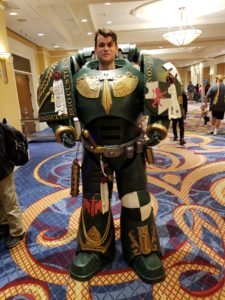Harked I to the Gaylord Convention Center this past Saturday for the Museum of Science Fiction’s Escape Velocity, their annual convention of all things science fiction, emphasis on the science.
Nice place.
Some guy tried to read my mind but it didn’t work.
Escape Velocity is a three day convention, but I only go on one of the days. No real reason, just do, I guess because one day there is like six days at any other convention because, Holy Hannah, they’ve got a lot of stuff going on. So many seminars, so little time, so you gotta be choosy.
I walked into a seminar billed as the Seven Dwarfs or Trappists, 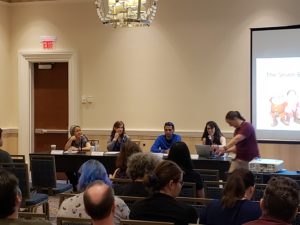
which I thought was some Disney version of severe monastic life but no, silly me, it was real NASA scientists talking about seven exoplanets discovered in the Trappist-1 system, which is a red dwarf star a few miles from here. Sounded like rocket science, so I pulled up a chair.
The Seven Dwarfs are planets very close to their red dwarf star (so is that eight dwarves?), all within the same size orbit of Mercury to our sun, which, you know, is purty durn close. You’d think they’d get burned but the red dwarf is a lot smaller and dimmer than Sol so you can fly ‘purt near to it without getting scorched. Two of the planets are in the “habitable zone;” not too hot, not too cold, which doesn’t mean they’re actually habitable because that red dwarf is a real pistol. It’s throwing out flares of ultraviolet and X-rays willy and nilly and at great intensities and amoebas don’t do well in that. There might be a magnetic field strong enough to protect the atmospheres of the two candidate planets, but who knows if either of them have magnetic fields, let alone atmospheres. That’s why the NASAers are very excited about the upcoming James Webb Space Telescope, which will make the Hubble look like a pair of opera glasses. Even more exciting are the upcoming ELT (Extremely Large Telescope) and the OWL (Overwhelmingly Large Telescope) and the 30 Meter Telescope…yep, that’s their names. Gotta hand it to NASA, no ambiguity. The NASAers showed us a very cool little film
taken from an earth-based telescope of four Jupiter-sized planets orbiting another distant star and whoa, imagine when we get the OWL up there? We’ll be able to watch Russian soldiers on guard duty exchange pictures.
The TRAPPIST planets are weird. Their year is a day and one side is always facing the red dwarf. Permanent day, permanent night, depending on where you are. Sounds like an intriguing story idea. If there are plants, then their leaves will be black to absorb as much light as they can. Alien, man.
I then stumbled into the last bit of a seminar with Greg Nicotero, 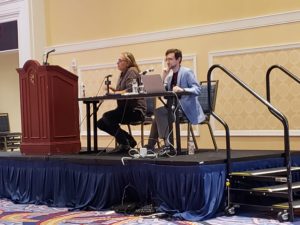 the guy who makes the zombies for the Walking Dead, which I have stopped watching because, geez, get to the point already, will ya? They cleared out for the seminar I was most looking forward to: Greg Bear.
the guy who makes the zombies for the Walking Dead, which I have stopped watching because, geez, get to the point already, will ya? They cleared out for the seminar I was most looking forward to: Greg Bear.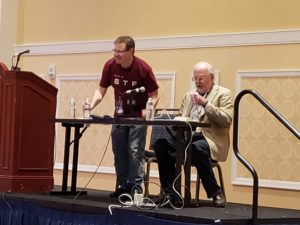 Yeah, Greg Bear who, along with Alastair Reynolds and Robert Sawyer, is one of the three best hard core SF writers out there, in no particular order.
Yeah, Greg Bear who, along with Alastair Reynolds and Robert Sawyer, is one of the three best hard core SF writers out there, in no particular order.
Amazing how much Greg Bear and I had in common. He was a Navy brat; I was an Army one. He lived in the Philippines as a child; I lived in the Philippines as an adult acting like a child. He read comic books and Creepy and Analog and got stacks of scifi out of the base library, just like I did. He even remembers the spinner racks filled with paperback copies of Moby Dick and Olaf Stapledon that graced the floor of every single drug store and five-and-dime in America. He, also, sucked at math, killing his astronomy career, as I killed my own. I’m thinking at this point that he may be a long lost brother but no, that’s not it: we geeks of a certain age share a common lifestyle.
He sold his first story while a junior in high school and wanted to write fantasy more than he did scifi but did write both, which can diminish your audience because they generally choose one or the other…which I do not think is true. I love both, as well as horror and magical realism and anything that involves the weird and the future and the scary and the wondrous, no matter what you call it. I think this plethora of genres and their attendant subs diffuses the bigger category of imaginative fiction (I guess they call it speculative fiction now). Interestingly, Bear fingers the New York Times’ reaction to JK Rowling as the reason for this plethora. The Harry Potter series was so blowing away all the other books on the NYT Best Selling List that they created the YA category to give someone else a chance. And from there, what have we gotten? YA Tween Animal Fuzzy LBGQT Urban Myth Superhero. With zombies.
Bear has written a lot. A. Lot. Pro. Lific, he is. I brought along a mere nine of his books, including three anthologies (Drat! Forgot my copy of The Mongoliad), for him to sign, which he was very gracious in doing so. When you’ve been writing quality stuff since the 70s, you’re going to have quite the corpus. And you’re going to be influential. He wrote a book called Psychlone, about a giant ghost attacking the West Coast (poet, don’t know it), an idea he stole from James Blish and which he thinks Ghostbusters stole from him. He was also a columnist, once writing an article about the Nebula Awards that killed his career with Del Rey (apparently, they took exception to his taking exceptions). He also wrote movie reviews, the first one being for the 1977 release of Star Wars, which I guess is akin to starting your quarterback career at the Super Bowl. De Laurentis Productions called him afterwards for suggestion about other scifi books to turn into scripts and he said, “Dune.” David Lynch has hated him ever since. I don’t know why. I thought Lynch’s version was decent. Sting as a Harkonnen, what’s not to like?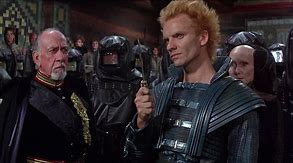
His most famous book is Eon, which was inspired by Stapledon, but it got rejected by just about everyone. It finally saw publication in the UK through Blue Jay Books and then Tor picked it up. His second big one was Blood Music, which began as a reaction to an Isaac Asimov article in TV Guide pooh-poohing the idea of shrinking people down to a certain size and still retaining their intelligence (this from the guy who wrote Fantastic Voyage).Small brain cells, doncha know. Bear got around that with the concept of intelligent cells. Take that, Asimov.
He’s acquired a host of new fans through his Halo novels. Halo novels. Okay. He admitted that the SF community takes a dim view of media series and yep, I’m one of those community peoples. It’s why I don’t read Star Trek or Star Wars novels. Seems like cheating. But, the kids love him, so who am I?
He has just finished his War Dogs trilogy, which is a salute to all the gyrenes and swabbies he knew while a Navy brat, to which I say, good on ya, mate. He is going back to fantasy with a novel called The Unfinished Land, a mixture of Lovecraft and Robert Louis Stevenson set in Elizabethan times. Sounds very cool.
Bear said that scifi is generally regarded as predictive, but that’s not true. It’s actually based on a willingness to suspend disbelief. Scifi gets a lot of things wrong (where’s my damn jetpack?). It’s really about principles that have not yet been proved or discovered, such as FTL travel (which I don’t believe will ever be possible, nor will we ever discover intelligent life in the universe. I mean, look at us).
We then got into Q&A and, I gotta ask, why do people use the Q&A as a means of proving how smart they are? Come on, just ask a simple question instead of prologueing it with a rambling, incomprehensible ten minute meander across the spectrum of scifi topics, all the time expecting the guest – or anyone in the audience, for that matter – to pick a question out of that mess. There was a lot of that from the audience and I gotta credit Mr. Bear with making sense of what was tossed at him. The only true straight up question he got was his source of inspiration and he said it was what Philip Jose Farmer called the Black Gang, the subconscious. Don’t ever criticize it. And then he said something of which I wholeheartedly approve: being a writer means being alone. It means developing your talent alone. And always, always, believe in yourself. If people say your stuff is crap, be polite, tip your hat, and no longer have anything to do with them.
Hear that, MFA Programs?
More on Escape Velocity later.




